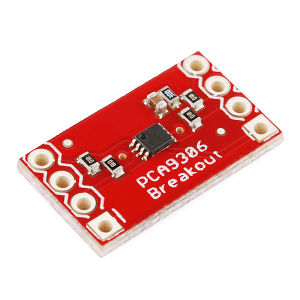Difference between revisions of "PCA9306 Level Translator Breakout"
From Geeetech Wiki
(→introduction) |
|||
| Line 1: | Line 1: | ||
== introduction == | == introduction == | ||
| − | [[File:PCA9306.jpg]] | + | [[File:PCA9306.jpg|300px]] |
This is a breakout board for the PCA9306 dual bidirectional voltage-level translator. | This is a breakout board for the PCA9306 dual bidirectional voltage-level translator. | ||
| Line 7: | Line 7: | ||
voltage level translators can be the key to making different parts play nice. | voltage level translators can be the key to making different parts play nice. | ||
| − | |||
==Features == | ==Features == | ||
Revision as of 02:09, 18 January 2013
introduction
This is a breakout board for the PCA9306 dual bidirectional voltage-level translator.
Because different parts sometimes use different voltage levels to communicate,
voltage level translators can be the key to making different parts play nice.
Features
- 2-bit bidirectional translator for SDA and SCL lines in mixed-mode I2C-bus applications
- Standard-mode, Fast-mode, and Fast-mode Plus I2C-bus and SMBus compatible
- Less than 1.5 ns maximum propagation delay to accommodate Standard-mode and Fast-mode I2C-bus devices and multiple masters
- Allows voltage level translation between:
1.0 V Vref(1) and 1.8 V, 2.5 V, 3.3 V or 5 V Vbias(ref)(2)
1.2 V Vref(1)and 1.8 V, 2.5 V, 3.3 V or 5 V Vbias(ref)(2)
1.8 V Vref(1)and 3.3 V or 5 V Vbias(ref)(2)
2.5 V Vref(1) and 5 V Vbias(ref)(2)
3.3 V Vref(1) and 5 V Vbias(ref)(2)
- Provides bidirectional voltage translation with no direction pin
- Low 3.5 Ω ON-state connection between input and output ports provides less signal distortion
